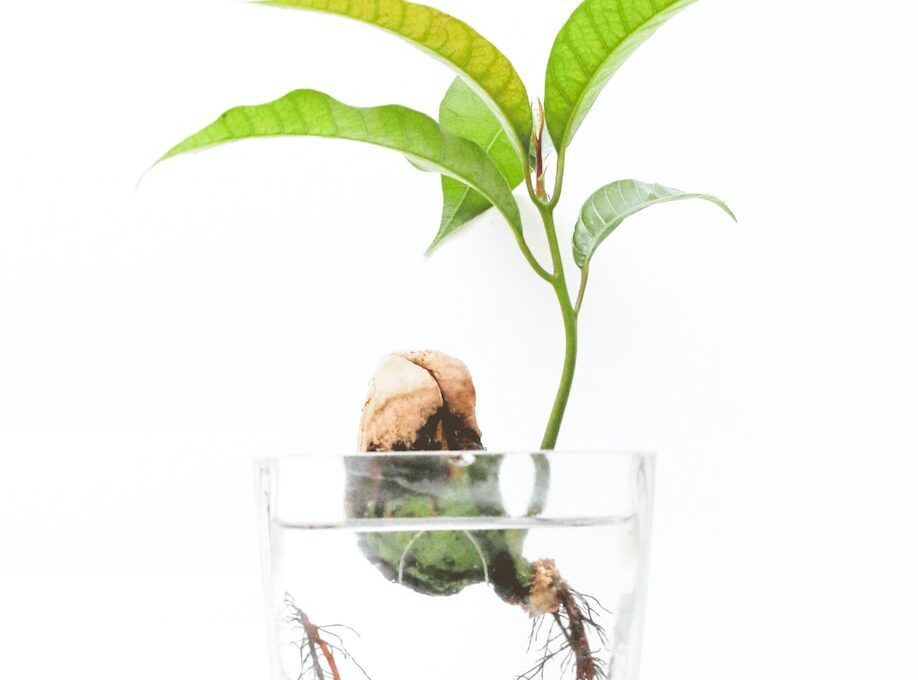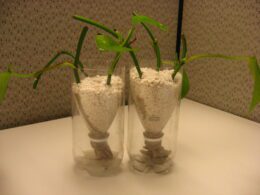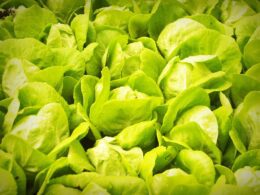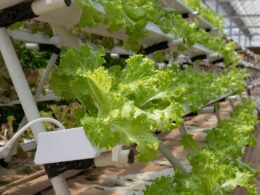Do you love the idea of growing plants without soil, but worry about overwatering them in your hydroponic system? Hydroponics is a method of growing plants using nutrient-rich water instead of soil. It’s a popular method among plant enthusiasts because it allows for more precise control over the plant’s environment, leading to faster growth and higher yields. However, with this method comes the risk of overwatering, which can be detrimental to your plants’ health.
In this article, we’ll explore the basics of hydroponics and the signs of overwatering in your system. We’ll also discuss the causes of overwatering and how to prevent it from happening in your hydroponic setup. By understanding the importance of proper care in hydroponics, you can ensure that your plants thrive and produce a bountiful harvest.
So, let’s dive in and learn about the potential risks of overwatering in your hydroponic garden.
Understanding the Basics of Hydroponics
You’ll quickly grasp the fundamentals of hydroponic gardening by learning the basics in this section. Hydroponics is a method of growing plants without soil, using nutrient-rich water solutions instead. This technique has many benefits, including faster growth rates, higher yields, and more control over the growing conditions.
There are different types of hydroponic systems, each with its own advantages and disadvantages. Some popular systems include deep water culture, ebb and flow, and drip irrigation.
Deep water culture involves suspending plants in nutrient-rich water, while ebb and flow uses a timer to flood and drain the growing tray. Drip irrigation involves dripping nutrient solution onto the plant roots.
Whether you’re growing herbs in your apartment or running a commercial farm, hydroponics can be a great way to grow plants. With the right setup, you can save space, water, and time while producing high-quality crops. By understanding the basics of hydroponics, you can choose the best system for your needs and start growing your own fresh produce today.
Signs of Overwatering in Hydroponics
If you’re watering your plants too often, you might notice some droopy, sad-looking leaves and an unpleasant, damp smell. These are some of the signs that your hydroponic system is being overwatered.
Overwatering can cause yellowing leaves and root rot, which can severely affect the health of your plants. Yellowing leaves are a common sign of overwatering in hydroponics. This happens when the roots are constantly submerged in water, leading to poor oxygenation. As a result, the plants are unable to access the necessary nutrients from the water. This can lead to a deficiency in essential nutrients like iron, which can cause the leaves to turn yellow.
In addition to yellowing leaves, overwatering can also cause root rot. This is a condition where the roots become waterlogged, leading to the growth of harmful bacteria and fungi. These organisms can infect the roots, causing them to rot and die. As a result, the plant’s ability to absorb nutrients from the water is severely compromised. This can have a negative effect on the overall health of the plant and its ability to grow.
Does Overwatering in Hydroponics Affect the Healthiness of the Food?
Overwatering in hydroponics can have a negative impact on hydroponic food’s health benefits revealed. Excessive irrigation can lead to insufficient oxygen levels in the root zone, affecting nutrient uptake and potentially causing root rot. Proper monitoring and adjustment of watering schedules are crucial to maintain the health and vitality of plants in a hydroponic system.
Causes of Overwatering in Hydroponics
Don’t let your plants drown – understanding the causes of overwatering in your system can save your precious crops from wilting away. Here are some common mistakes that can lead to overwatering in hydroponics:
-
Lack of drainage: If your hydroponic system doesn’t have adequate drainage, it can lead to water pooling in the bottom of your containers. This can cause the roots to suffocate, leading to stunted growth and even death.
-
Overzealous watering: It’s easy to get excited about your hydroponic garden and want to water your plants frequently. However, overwatering can lead to waterlogged roots, which can damage the plant’s ability to absorb nutrients and oxygen.
-
Inconsistent watering: On the flip side, inconsistent watering can also lead to overwatering. If you let your plants dry out too much between waterings, they may need more water than usual to recover. This can lead to waterlogging and overwatering.
-
Improper nutrient mix: If you’re using a nutrient mix that’s too concentrated, it can lead to overwatering. When the plant can’t absorb the excess nutrients, they can accumulate in the soil and lead to waterlogging.
Remember, the effects of overwatering can be devastating to your hydroponic garden. It can cause root rot, stunted growth, and even death. By avoiding these common mistakes, you can ensure that your plants get the water and nutrients they need to thrive.
How to Prevent Overwatering in Hydroponics
Make sure your plants are thriving by learning how to prevent drowning them in excess water. Overwatering is a common mistake in hydroponics that can lead to root rot, nutrient burn, and even death of the plants. The good news is that preventing overwatering is not difficult if you follow these simple steps.
First, make sure you have a proper drainage system in place. Hydroponic systems usually have a drainage hole or hose that allows excess water to be removed. You can also add a water level indicator to monitor the amount of water in your system. Second, manage the pH level of your nutrient solution. High pH levels can cause the roots to absorb too many nutrients, leading to nutrient burn. Finally, avoid overfeeding your plants. Always follow the recommended nutrient dosage and reduce it if necessary.
To make it easier for you to understand how to prevent overwatering, here’s a simple table that outlines the do’s and don’ts of hydroponic watering:
| Do’s | Don’ts |
|---|---|
| Monitor water levels regularly | Overwater your plants |
| Use a drainage system | Allow stagnant water to accumulate |
| Manage pH levels | Ignore pH levels |
| Follow recommended nutrient dosage | Overfeed your plants |
By following these guidelines, you can ensure your hydroponic plants receive the right amount of water and nutrients they need to thrive. Preventing nutrient burn and managing pH levels are essential to their growth and overall health. Keep in mind that overwatering is a common mistake, but with proper care and attention, you can avoid it and enjoy a successful hydroponic garden.
Conclusion: Importance of Proper Care in Hydroponics
Taking proper care of your hydroponic plants is essential to their growth and overall health. By following the guidelines outlined in this article, you can ensure that your plants receive the right amount of water and nutrients they need to thrive. Proper care means maintaining a balance between nutrient intake and water absorption, as overwatering can lead to root rot and other problems.
Here are four reasons why proper care in hydroponics is crucial:
- A balance of nutrients is necessary for healthy plant growth.
- Overwatering can lead to root rot and other issues that can harm your plants.
- Common pests in hydroponics, such as aphids and spider mites, can quickly take over if your plants are not healthy.
- By taking care of your hydroponic plants, you’ll not only have healthier plants but also a higher yield.
It’s important to remember that hydroponic plants are not like traditional soil-grown plants, and they require a different level of care. Maintaining a balance of nutrients and water is crucial to their growth, and paying attention to signs of stress or pests can help you catch issues early on. Taking the time to properly care for your hydroponic plants can result in a bountiful harvest and a successful hydroponic garden.
Frequently Asked Questions
Can hydroponics be underwatered?
Underwatering prevention is crucial to the success of your hydroponic plants. When plants are underwatered, their growth and health can be severely impacted. To prevent underwatering, make sure to check the water levels regularly and adjust as needed.
It’s also important to monitor the plant’s leaves for signs of wilting or dryness. If you do notice signs of underwatering, increase the water supply and adjust the growing conditions accordingly. By taking these steps, you can ensure that your hydroponic plants receive the proper amount of water and nutrients they need to thrive.
Do different hydroponic plants have different water requirements?
Different hydroponic plants do have varying water requirements. It’s important to research each type of plant and use appropriate watering techniques to ensure optimal growth.
Some plants, like lettuce, thrive in consistently moist conditions while others, like tomatoes, prefer to dry out slightly between waterings. Nutrient requirements also vary among different plants, so it’s crucial to monitor and adjust nutrient levels accordingly.
Overwatering can lead to root rot and other issues, so it’s important to find the right balance for each plant. By paying attention to the specific needs of each hydroponic plant, you can ensure healthy and abundant growth.
How often should I check the water levels in my hydroponic system?
To ensure optimal growth for your hydroponic plants, it’s crucial to regularly monitor the water levels in your system. Water level monitoring allows you to prevent overwatering, which can lead to root rot and other issues that can harm your plants.
Checking the water levels every day or two is recommended, but the frequency may vary depending on the type of plant and the size of your system. It’s better to be safe than sorry, so don’t hesitate to check the water levels whenever you have a chance.
By doing so, you’ll be able to maintain a healthy growing environment for your hydroponic plants and achieve the best possible results.
Can tap water be used in hydroponics or does it need to be filtered?
You may be wondering if tap water can be used in hydroponics or if it needs to be filtered. While tap water can be used in hydroponics, it’s important to consider the quality of the water.
Tap water can contain high levels of chlorine, fluoride, and other chemicals that can harm plants in hydroponic systems. Filtered water can provide a cleaner and safer environment for your plants to grow.
By using filtered water, you can reduce the risk of plant damage and increase the overall health and yield of your crops. Don’t take any chances with your hydroponic system, invest in filtered water for optimal results.
What is the best way to dispose of excess water in a hydroponic system?
When it comes to hydroponics, it’s important to know how to dispose of excess water properly.
One option is to compost the excess water, which is a great way to reuse nutrients and reduce waste. Simply add the excess water to a compost pile and let nature do its thing.
Another option is to reuse the excess water in the system. This can be done by collecting the excess water in a reservoir and then using it to water the plants when needed.
Both of these methods are environmentally friendly and can help you save water and resources. So, instead of just throwing away excess water, consider composting or reusing it to help your hydroponic system thrive.
Conclusion
Congratulations! You’ve learned about the basics of hydroponics and the signs, causes, and prevention of overwatering in hydroponics.
It’s important to remember that hydroponics is a delicate system that requires proper care and attention. Overwatering can lead to root rot, mold, and other diseases that can harm your plants.
To prevent overwatering, make sure to monitor the moisture levels of your hydroponic system regularly. Use a timer to control the water cycle, and avoid leaving the plants in standing water.
By following these simple steps, you can ensure the health and growth of your hydroponic plants. Remember, a little bit of care goes a long way in hydroponics!









